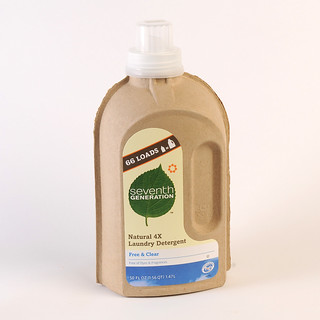Have you ever heard the phrase, “children learn by our actions, not by our words?” When it comes to many issues, this is very true. Children emulate what they see. If you want your children to grow up to be environmentally conscious and responsible adults, show them what that looks like. Show them what it means to be eco-friendly. Here are ten great ways to become eco-parents, and teach your kids to respect and care for themselves and the world they live in:
| CSA share (Photo credit: .m.e.c.) |
#2. Recycle. This is such a small thing but it has a huge impact. If your community waste management program offers a recycling program, then getting your children involved is easy. Have them recycle paper, clean out plastic containers and help with the recycling system in your home. If you don’t have the convenience of curbside recycling, it is a bit more of a process, but children can still get involved and it can become a family routine.
#3. Walk, ride your bike and take public transportation when possible. Demonstrate to your children the value of conserving resources by practicing good eco-friendly habits.
#4. Teach them to appreciate nature by taking them on nature walks, visiting wildlife preserves and learning about animals and their habitats.
#5. Use reusable products whenever possible. One very simple tip is to use reusable shopping bags. Children are great for helping you remember to bring them along when you head to the store!
#6. Grow a garden. Children of all ages love digging their hands in the dirt and growing things. Let them choose what they want to grow, help them cultivate it and teach them about planting and growing their own fruits and vegetables.
#7. Travel. Visiting other places helps children develop an appreciation and an awareness for the world outside their immediate surroundings.
| Natural Laundry Detergent, Free and Clear (Photo credit: artizone) |
#9. Breastfeed infants. Breastfeeding isn’t just better for a child’s health, it eliminates the need to manufacture and distribute formula. And when your other children see you breastfeeding their sibling, they begin to develop an appreciation for its practicality - and for the efficiency of nature to provide what we need.
#10. Buy used. Clothing, furniture and even kitchen appliances can all be purchased used. This keeps them out of the landfills, and it saves money and resources manufacturing and distributing these items. And you save a bit of money too.
Being an eco-parent is really about adopting environmentally friendly practices that make sense for you and your family, and taking responsibility for your role in the natural world. Your children will grow up knowing you thought it was important to conserve, preserve, and take care of their health, and the health of the world we live in, and hopefully they’ll adopt the same responsible philosophy as they grow into adults themselves.



No comments:
Post a Comment